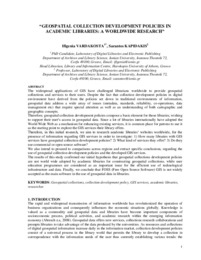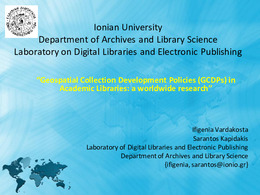| dc.contributor.author | Βαρδακώστα, Ιφιγένεια | el_GR |
| dc.contributor.author | Καπιδάκης, Σαράντος | el_GR |
| dc.contributor.author | Vardakosta, Ifigenia | en |
| dc.contributor.author | Kapidakis, Sarantos | en |
| dc.coverage.spatial | GR - Αθήνα | en |
| dc.date.available | 2013-09-09T13:17:09Z | |
| dc.date.issued | 2011 | |
| dc.identifier.uri | http://hdl.handle.net/10797/13093 | en |
| dc.description | Περιέχει το πλήρες κείμενο | el_GR |
| dc.description.abstract | The widespread applications of GIS have challenged librarians worldwide to provide geospatial collections and services to their users. Despite the fact that collection development policies in digital environment have derived from the policies set down in traditional environments of information, geospatial data address a wide array of issues (metadata, standards, reliability, co-operations, data management etc) that require special attention as well as an understanding of both cartographic and geographic concepts.
Therefore, geospatial collection development policies compose a basic element for those libraries, wishing to support their user’s access in geospatial data. Since a lot of libraries internationally have adopted the World Wide Web as a mechanism for enhancing existing services, it is common place for patrons to use it as the starting point to explore the GIS services their library offers.
Therefore, in this initial research, we aim to research academic libraries’ websites worldwide, for the presence of information regarding GIS services in order to investigate: 1) How many libraries with GIS services have geospatial collection development policies? 2) What kind of services they offer? 3) Do they use commercial or open source software?
We also intend to proceed to comparisons across regions and extract specific conclusions, regarding the use of geospatial collection development policies and the developed GIS services.
The results of this study confirmed our initial hypothesis that geospatial collections development policies are not world wide adopted by academic libraries for constructing geospatial collections, while user education programmes are considered as an important issue for the efficient use of technological infrastructure and data. Finally, we conclude that FOSS (Free Open Source Software) GIS is not widely accepted as the main software in the use of geospatial data in libraries. | en |
| dc.language.iso | eng | en |
| dc.rights | info:eu-repo/semantics/openAccess | en |
| dc.title | Geospatial collection development policies in academic libraries: a worldwide research | en |
| dc.type | Conference Object | en |
| dc.subject.uncontrolledterm | Geospatial collections | en |
| dc.subject.uncontrolledterm | Collection development policies | en |
| dc.subject.uncontrolledterm | GIS services | en |
| dc.subject.uncontrolledterm | Academic libraries | en |
| dc.subject.uncontrolledterm | Research | en |
| dc.subject.JITA | Βιβλιοθήκες ως φυσικές συλλογές, Ακαδημαϊκές βιβλιοθήκες | el_GR |
| dc.subject.JITA | Libraries as physical collections, Academic libraries | en |
| dc.identifier.JITA | DD | en |

